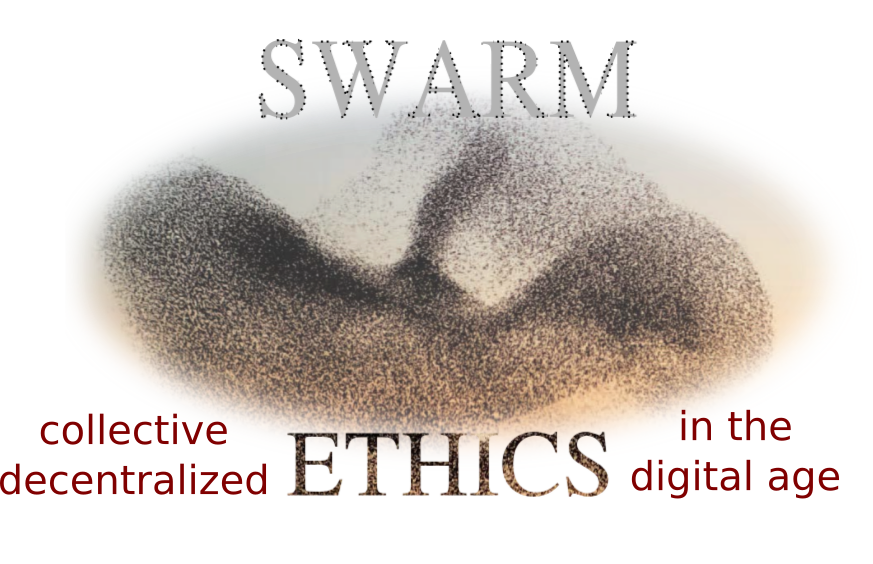“Culture eats strategy for breakfast” the legendary quote attributed to Peter Drucker, the father of modern management, successfully underscores the overruling importance of organizational culture when it comes to corporations and planned execution. Especially in the context of hybrid global business multiverses relying on systemic data-driven pervasive models with exponential socio-economic and human transformative power. Foundations are shaken.
Undeniably risk management plays a tenor role in mapping out corporate strategies in uncertain and unstable technological environments. However its “tone at the top” remains prudent and protective at the best, and refraining and constraining at the worst. To respond with risk to risk seems an exponentially risky strategy in the long run. Beyond a business issue of effectiveness and optimization, choosing the right management approach also reflects on the overall psychological dimension of a corporation: its mindset. That’s where Swarm Ethics™ and Quality Management go the extra-mile.
In complex cross-industry landscapes, businesses are mostly overwhelmed by sudden multiple, disruptive powers of emerging technologies. The need to rethink the current frameworks and adopt the right framework to successfully navigate through digital transformation has become vital.
Swarm Ethics™ is versatile and most effective in complex, nonlinear cyber-physical systems (CPS) and distributed systems. CPSs are a way to encompass the large spectrum of technologies including robotics, internet of things (IoT), Systems on Chip (SoC), embedded systems where synchronization, reduction of latency and digital trust is key.
Swarm Ethics™ combined to Quality Management offers the full package and is pluri-cultural and trans-generational. Its agility and inclusiveness appeals to Gen Y and Gen Z as well as baby boomers, and the in-betweens. A safe and sound managerial and ethical shell that addresses both soft factors like culture and people, and hard factors like organizational architecture and processes.
Where Peter Drucker meets Swarm Ethics™
Fact is that the technological landscape undergoes a fundamental transition. The “20 Year Emerging Technology Landscape” map by the Service Innovation Lab offers a global outlook. This landscape has been shaped by consultation with other emerging tech leaders and muliple sources that include OECD, World Economic Forum, McKinsey Institute, Gartner – Hype Cycle, SAP and AIForum New Zealand.
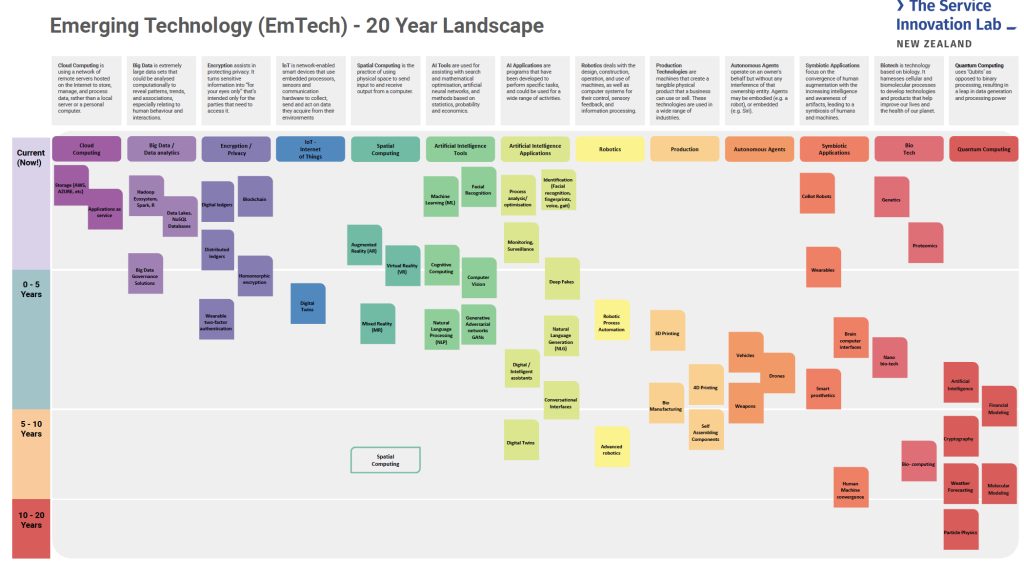
This visualization shows how complex and granular the landscape of emerging technology has become. A plethora of systems and technologies colliding on the market, each day, in need to be integrated on a technological, strategic and human level. This is where integrative thinking is needed.
Throughout his immense work, Peter Drucker always excelled in integrative thinking to identify the key assumptions at issue. Integrative quality and moral concerns being pillars of his thought. For Drucker quality is to be understood in conjunction with value and purpose. Such is Swarm Ethics™ as a highly purpose-driven approach to ethics.
Ever since, Drucker was also profoundly concerned with the question of essential responsibilities, of corporate or social responsibility. This makes Drucker’s managerial universe so appealing these days, especially in combination with ethics: the view of management as a holistic purpose-oriented philosophy beyond mercantile and performance-oriented goals. So does Swarm Ethics™: it goes beyond mere cognitive ethics to address a practical, collective togetherness build on emergent ethics. Offering a new ethical formula for the digital age.
“The greatest danger in times of turbulences are not the turbulences: it is to act with yesterday’s logic.” (Drucker)
What are Drucker’s key ideas that resonate with Swarm Ethics™ and Quality Management?
🚥 Decentralization – Drucker discounted the command and control model and asserted that companies work best when they are decentralized. Empowering others and delegating decision-making. For Swarm Ethics™, as a horizontal model (versus top-down), decentralized decision-making is key. It boosts effectiveness and in real-time adaptability which in itself is risk-confronting versus risk-avoiding.
🚥 Social Responsibility – Corporations and people in power are accountable on the basis of Primum non nocere — First, do no harm. Drucker wrote in his 1973 Management: Tasks, Responsibilities, Practices, “If the managers of our major institutions, and especially of business, do not take responsibility for the common good, no one else can or will.” A company’s primary responsibility is to serve its customers, and contribute to the whole of society. Profit is not the primary goal.
🚥 Organizational Effectiveness – The idea to render a business qualitatively optimal above its operational processes is one major duty of an organization. Organizational effectiveness also drives Swarm Ethics™ which is not only a new concept of ethics but is built on a new dynamic system for emerging ethics.
🚥 Knowledge Work – Drucker coined the term “knowledge worker”. Empower people to think in convergent and divergent ways to help them better perform. Convergent and divergent are also two forces that drive Swarm Ethics™ to reach a mean of ethical consensus.
🚥 Management by Objectives (MBO) – Based on the belief that employees perform better when they understand the meaning or the purpose. Swarm Ethics™ is purpose-driven and not based on hard-coded cognitive judgmental frames inherited by traditional ethics.
🚥 SMART– Objective setting method used for KPIs and is part of MBO.
🚥 Innovation following 7 steps described in Drucker’s article The Discipline of Innovation. Four areas of innovation exist within a company or industry: unexpected occurrences, incongruities, process needs, and industry and market changes. Three sources exist outside a company: demographic changes, changes in perception, and new knowledge.
The swarm: a success and quality pursuing multi-agent system
Swarm Ethics™ is based on swarm intelligence. And like any biological system on earth, the swarm, as a collective purpose-driven system, follows a path. Nonlinear it is.
The collective effort is built on success, thus the operational execution by the swarm is linked to optimization and effectiveness. Swarm Ethics™ too: emergent collective ethics – with integrative quality and optimization for better decision-making.
Findings on the collective intelligence of orcas are revealing.
Killer whales have a 75-86% hunting success rate. Optimal excellence. Their hunting techniques vary: from encircling their prey, to producing bubble or waves to disorient and destabilize the prey. All is perfectly orchestrated by collectively pursuing one goal.
Similarly, the ant colony optimization (ACO) algorithm is one of the most well-known examples of swarm intelligence algorithm. It has been successfully applied to a wide range of optimization problems, in vehicle routing, and network design. Or the particle swarm optimization (PSO) algorithm, which is inspired by the flocking behavior of birds and fish. The PSO algorithm has been used to train neural networks, optimize the design of complex systems. Both are always used as optimization tool.
Optimization through effective Resource Allocation
A swarm by nature fully employs and deploys its total capacities and resources towards achieving the highest resource allocation for success. Thus ensuring effectiveness and efficiency.
Continuous optimization through real-time perception-action interplay, swift reactions and collective purpose-driven decision-making. The idea of success is endemic to the swarm. And that’s where Swarm Ethics™ meets Quality Management (QM) or Total Quality Management (TQM).
Contrary to Quality Management, risk management does not focus on real-time optimization but rather on future protection and prudence.
It seems that the hype around risk management is the result of several converging instances that happened over the past 5 years (starting with GDPR on May 25, 2018). On the one hand, the predominance of a risk- and harm-based rhetoric about AI used in most regulatory, policy and standardization acts (most prominent example: AI EU Act and its four-tiered risk-based approach to AI), reports or papers, and articles in the mainstream press and social media; on the other hand, immature, non robust and ethical-bashing and regulatory-infringing technologies wildly unleashed at an unprecedented cadence on the market.
In such chaotic and nonlinear environments, business and ethical frames are crucial. To choose between a beneficent quality management approach or a nonmaleficent risk management frame is key. Both are prone to address the complex situations companies face, however they bear different consequences corporation should reflect upon with care. An ethical choice per se.
At the end of the day, to be competitive, companies need to build an ecosystem of trust. In- and outside. Up-and downstream. The value chain of trust is crucial. This is where Quality Management tools combined to dynamic collective Swarm Ethics™ can be decisive.
The importance of Quality Management
As Swarm Ethics™ is leaning on swarm intelligence, the idea of effectiveness and optimization is naturally embedded.
One of the main reasons we have designed Swarm Ethics™ as a novel concept for applied ethics in the digital age was the need for powerful, ethical efficiency, applied optimization to counterbalance hazardous and harmful emergent situations calling for ethical decision-making.
The idea was to empower people and solidify their sense of responsibility over the progressively growing lack of responsible design and data privacy with emerging technologies.
Why Quality management?
Quality management foremost is a collective and customer-focused process of business operation improvement.
It is a collaborative tool for qualitative improvement and purpose-setting, thus perfectly resonating with the main imperatives of Swarm Ethics™: collaboration, synchronization and alignment.
In 1931 Walter Shewhart published “Economic Control of Quality of Manufactured Product” and introduced the inspection-based approach to quality. In this article we are not referring to the statistical part of the concept, but we are pointing to the idea of continuous improvement and inference, and more specifically the Shewart cycle “plan-do-check-act“.
Similarly TQM is the perfect extension to Swarm Ethics™ as it “requires all stakeholders in a business to work together to improve processes, products, services and the culture of the company itself.”
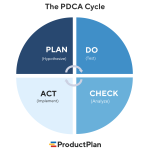
Later in Japan in the 1950s, Total Quality Management (TQM) has been developed by Toyota as a commitment to continuous improvement by constant reassessment of processes.
In this context, we like to stress on two popular and classic project management tools that are highly quality-oriented and prove particularly effective for holistic Quality Management.
The PERT chart and the DEMING wheel are two methods which comprise risk awareness approaches in its process of qualitative planning.
The DEMING Wheel
In the context of project management and agile management, the DEMING wheel or PDCA is one of the most popular and practical tools. Developed by W. Edwards Deming, a close collaborator of Shewhart, the Plan-Do-Act-Check Cycle spins on the central idea of continuous improvement.
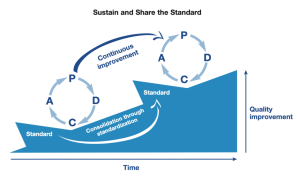
Its agile frame proves to be a perfect fit for high-speed, transformational and multi-layered technological implementation that require milestones and check-points.
Heavily used in safety-reliant industries such construction, aeronautics, logistics and also in agile and lean management for start-ups, its application has proved most effective in cross-industry processes with far-flung supply chains and numerous stakeholders.
Continual Improvement, an ethical duty?
“The key is to practice continual improvement and think of manufacturing as a system, not as bits and pieces.” is a nowadays still meaningful quote by Deming when it comes to systems thining.
According to Deming, the individual is the most important part of the system.
Excerpt by DEMING
“The first step is transformation of the individual. This transformation is discontinuous. It comes from understanding of the system of profound knowledge. The individual, transformed, will perceive new meaning to his life, to events, to numbers, to interactions between people.”
“Once the individual understands the system of profound knowledge, he will apply its principles in every kind of relationship with other people. He will have a basis for judgment of his own decisions and for transformation of the organizations that he belongs to.”
 Deming offered 14 key principles for management for transforming business effectiveness. We chose to present 5 points relevant to our purpose of presenting the endemic link between Swarm Ethics™ and Quality Management. The points were first presented in Deming’s book “Out of the Crisis”
Deming offered 14 key principles for management for transforming business effectiveness. We chose to present 5 points relevant to our purpose of presenting the endemic link between Swarm Ethics™ and Quality Management. The points were first presented in Deming’s book “Out of the Crisis”
PERT - Program Evaluation Review Technique
The PERT – Program Evaluation and Review Technique – was developed in the 1950s by the US Navy as a predictive project management tool calculating most effective tasks and critical paths for a project.
PERT comes as a chart with a visualized network diagram of wireframes, nodes and milestones. The advantage of the PERT is that it draws a comprehensive picture of a project, product, service by using a technique of slicing a project in step-by-step granular tasks from start to finish.
This allows to identify risks, critical tasks, and time- or cost-sensitive chunks of a project. Beyond being used to streamline projects, the PERT also allows to improve resource management, identify dependencies, calculate slack and identify critical path. Combined to the Gantt it effectively frames most projects that feature uncertain and sensitive conditions.
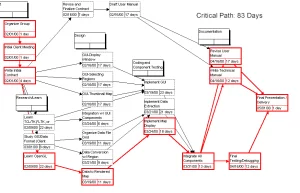
Beyond the operational visibility, PERT allows to uphold the quality of a project, product or service. The technique is perfect for complex and uncertain environments where multiple outcomes may be envisioned and risky.
PERT incorporates risk identification and mitigation in a whole. In this scenario the risk is part of the process and not overtoning the entire process. The process remains quality-oriented.
By emphasizing on optimization, operational excellence is continuously enhanced. From streamlining and connecting seamlessly business units to automating routine tasks to and complex processes.
Swarm Ethics™ and Quality Management: A Positive Corporate Culture Mindset
One of the major benefits of Quality Management is the positively anchored mindset of empowerment within the company.
Employees are ethically infused with a deep sense of responsibility, accountability and transparency. A mindset of duty of care intra- and extra-muros is nurtured and deployed. From supply chain management to customer service and data governance. Up- and downstream.
This decentralized and collective connected grid system is the foundational topology of Swarm Ethics™. It allows to rapidly augment and disseminate the integrative and deontological thread of Quality Management. Thus enabling companies to effectively empower executives and employees alike, orchestrate efforts meaningfully, and synchronize networks effectively to reach brand charisma.
Participative innovation
The inclusive collective culture fueled by Swarm Ethics™ and Quality Management is favorable ground for participative innovation, and consequently new revenue streams. Customer experience will benefit from the collective dynamism.
Linking and synchronizing in decentralized ways
Quality Management strives to put everyone on the same page at the same time by linking data sources, sharing information across systems, and most importantly connecting all stakeholders through shared meaning and purpose.
“Quality and Ethics by Design” mindset
With Swarm Ethics™ the focus lies on the collaborative drive, moving forward, now and here, in a responsible, transparent, accountable way. Duty of care is deployed in real-time through collective intelligence and augmented by decentralized cohesion. Biological optimization at its best.
Thus quality and responsibility are naturally embedded and lead to a frame of deontological excellence of “Quality and Ethics by Design”.
Swarm Ethics™ & Quality Management: creating a Magnetic Field of Trust.
So, yes, “Culture eats strategy for breakfast”, But not ethics!
Building an actionable, earth-grounded and collective frame around quality versus risk boils down to choosing, not the right management style, but the right proportions between beneficence and nonmaleficence. The goal might be similar but perspectives and consequences differ.
As a swarm is built on simple kinetic principles of connectedness, alignment, and constant re-calibration while moving forward, it naturally avoids obstacles in real-time by using its collective intelligence. Never does a swarm plan on how to avoid a tree in next three days. It pursues its goal with optimal resource allocation and synchronization dedicated to the goal, the purpose.
However, in highly transformational times, anxiety and fear may block the most open and mentally agile people. Deploying a solid and value-laden managerial style will lend both individuals and institutions the needed robust references.
Beyond being an ethical management frame to align technology, value and people, Swarm Ethics™ and Quality Management are positive mindset builders for a resilient corporate culture. Successfully shaping a sense of belonging as well as a sense of purpose which are the actual performance and productivity boosters in the long run. Thus creating a magnetic field of trust.
A shared vision spurred by emerging ethics and collective quality to move in a fragmented, high-speed evolving landscape will make a real difference – for employees and employers. And customers.
